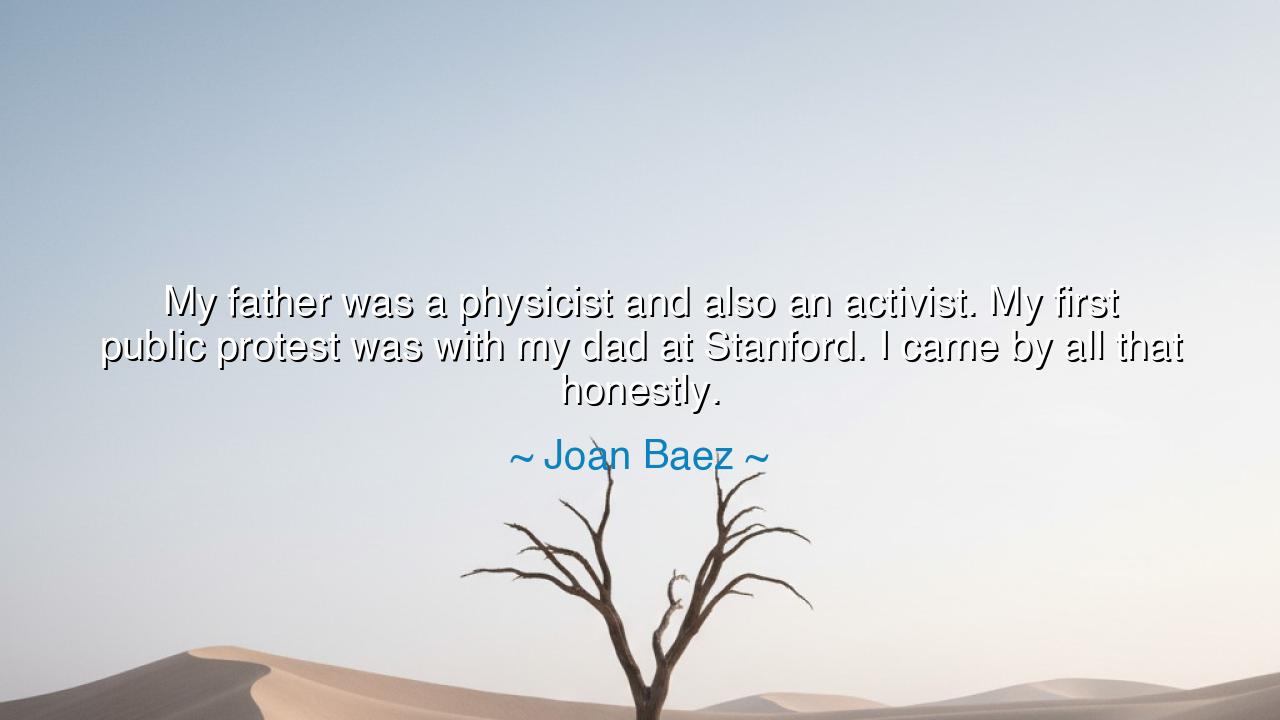
My father was a physicist and also an activist. My first public
My father was a physicist and also an activist. My first public protest was with my dad at Stanford. I came by all that honestly.






“My father was a physicist and also an activist. My first public protest was with my dad at Stanford. I came by all that honestly.” — Joan Baez
In these luminous words, Joan Baez, the voice of a generation and the conscience of an age, reveals the roots of her calling. Her reflection is not merely about lineage — it is about inheritance of spirit, the sacred passing down of conviction from parent to child. She speaks of her father not only as a man of science but as a man of principle — one whose reason did not harden his heart, but rather guided it toward justice. Her words remind us that true education begins not in classrooms, but in the examples we witness; that the virtue of courage is not learned by lecture, but by living beside the brave.
To say, “I came by all that honestly,” is to confess that her activism, her defiance against injustice, and her deep compassion for humanity were not accidents of personality. They were gifts of inheritance, passed down through the silent teaching of a father’s life. The physicist, grounded in reason, and the activist, aflame with conscience — these two forces met within him and shaped the child who would one day wield her voice as a weapon of peace. Thus, Joan Baez’s life became the flowering of her father’s seed — a living continuation of his principles, carried not in his mind, but in his daughter’s heart.
The origin of this wisdom stretches back through the great chain of history. Many of the world’s most luminous souls were born from the union of intellect and integrity, of knowledge and compassion. Consider Mahatma Gandhi, who learned the value of truth and moral strength from his mother, a woman of quiet faith whose fasting and devotion shaped his understanding of nonviolence. Or Eleanor Roosevelt, who, though raised in privilege, found her social conscience through the teachings of her uncle, Theodore Roosevelt, and later became a voice for human dignity. So too did Joan Baez inherit from her father the sacred duty to speak truth to power, even when that truth was costly.
Her mention of Stanford, her first protest beside her father, is no casual memory. It symbolizes the beginning of awakening — the moment when a young soul steps from observation into participation. Many children watch their parents and learn to imitate; few are led by them into the living arena of conviction, where belief becomes action. That moment, standing beside her father in protest, was not just an event; it was a rite of passage — the passing of the torch. From that day, her path was set: her music would be her march, her songs her banners, her compassion her weapon.
And yet, there is humility in her tone. She does not boast of righteousness but acknowledges the quiet power of example. “I came by all that honestly,” she says — meaning she did not inherit fame or fortune, but integrity. In those few words lies an ancient truth: that honesty of heart, passed down through generations, is the purest form of legacy. The world often mistakes inheritance for wealth, but the wise know that the true inheritance is character — the courage to do what is right, even when the world turns away.
There is also a profound harmony in the duality of her father’s life — the scientist and the activist, the thinker and the doer. In him, the rational mind and the moral soul did not compete, but cooperated. For what use is knowledge if it serves no conscience? What worth is intellect if it turns away from suffering? The union of those two forces — truth and justice — gave rise to Joan Baez’s art. Her songs were not mere melodies; they were arguments of the heart, sung in the language of humanity. Through her, her father’s two worlds found voice — the precision of reason and the passion of compassion made one.
So, O listener, let this be your lesson: what you pass to your children will echo beyond your years. Teach not only through words, but through action. Let your convictions be visible, your compassion alive, your integrity unshaken. If you are a parent, know that your courage may one day become your child’s strength. And if you are a child, honor the wisdom of those who came before you by living it more deeply. For the world is built not merely by heroes, but by the generations of quiet souls who pass on the torch of truth.
And when you, too, stand one day in the place of your forebears — when your own voice rises for what is right — may you be able to say, as Joan Baez said with gratitude and grace: “I came by all that honestly.” For there is no higher praise a soul can give to its ancestors, and no greater legacy it can leave to its descendants.






AAdministratorAdministrator
Welcome, honored guests. Please leave a comment, we will respond soon